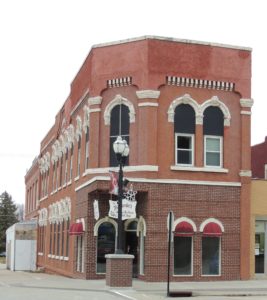
The Jefferson city council took another vintage downtown building off the owner’s hands, but one council member wants to put a hold on acquiring any more buildings, at least for a while.
The council held a special meeting Nov. 19 to consider a resolution approving a purchase agreement for the building at 100 E. State St.
Angie’s Tea Garden operated on the first floor of the building until a frozen pipe in an upstairs apartment burst last February and dumped more than 4,000 gallons of water. All three floors of the building were damaged and the building was declared unsafe for use.The purchase agreement with owner John Copeland calls for no payment for the building but for the city to pay the current year taxes. That amount is about $1,200, according to city attorney Bob Schwarzkopf.
The council also approved a contract with Franks Design Group PC for professional architectural and structural design services for the building at a cost of $19,960. The plan will be for work needed to stabilize the building, which will include a new roof.
A local group of possibly as many as 50 people is forming to purchase the building and finish the rehabilitation once it is stabilized. Some members of the group attended the council meeting. They said there may be a public announcement of their intentions in the next two weeks.
The building is the sixth the city has been given or purchased; only one of them has been sold.
Early in the discussion before accepting the purchase agreement on 100 E. State, council member Dave Sloan said, “It’s my opinion – I’m hearing from a lot of people – we need to quit accumulating buildings. This one is a safety hazard. I realize that… We’ve got seven or eight buildings up on the square that are empty. We’ve had them for a long time. We need to see some of them on the market ready to go, or sold, before we accumulate any more buildings.”
Mayor Craig Berry suggested Sloan’s concerns be passed along to building and zoning/ special projects coordinator Nick Sorensen with a request for a status report.
Berry also justified the length of time it is taking to rehab the buildings, saying the city is using TIF funds for the work, and that isn’t unlimited.
Sloan said building owners who are in trouble with their taxes or don’t want to put money into their buildings “walk away from them and then we get it dumped on us. I don’t know if there’s a way we can not let that happen. It seems like there should be.”
Council member and future mayor Matt Gordon said rehabbing the buildings is much less expensive than new construction should the vintage buildings need to be razed.
About 100 E. State, he said, “I can’t even imagine the cost of replacing that building if it got to the point we had to tear it down.”
Council member Harry Ahrenholtz suggested that since funds are limited, the city should focus on the buildings that are the most likely to be sold when they’re completed.
“I keep hearing we have buyers for several of these buildings, but we don’t seem to be progressing much on that, either… I don’t know if we have buyers or not. It seems to be secretive on who some of these buyers are,” Sloan said.
The city now budgets $600,000 per year for building rehab in its urban renewal plan, with a maximum of $150,000 per year. The council could amend that, Schwarzkopf said.
Berry asked if the council would be willing to give a building to a new business coming to Jefferson in order to promote the city. Council member Darren Jackson said it would need to be on a case-by-case basis, and such a precedent could be “a slippery slope.”
Berry and Ahrenholtz suggested selling buildings on contract or with the purchase price as a forgivable loan.
“We’re not going to come out on these buildings. We’re going to have more in to them than they’re worth,” Sloan said. “But somebody is getting a building that all they need to do is paint and put some shelving in. All the tough, expensive stuff is done.”
The discussion will continue at a future council meeting.
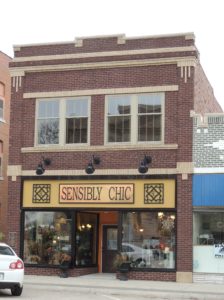
Of six buildings, 111 E. Lincoln Way is the success story. The city purchased the building in September 2015 for $50 plus closing costs. At the time, there was a gaping hole in the roof and there was concern the entire building would collapse. The council committed $150,000 to rehabilitation.
Rosie and Ray Tucker later purchased the building with a 10-year forgivable loan from the city for the total project cost over the original $150,000. After the Tuckers’ purchase the project garnered a $74,500 Challenge Grant from the state.
The Tuckers’ business, Sensibly Chic, opened in October 2017 and has become a destination shop. They live on the second floor with what they call “the best view in town,” facing the front of the courthouse.
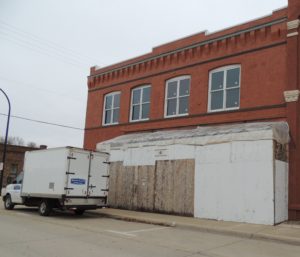
The city has owned 205 N. Wilson Ave since August 2015. It was given to the city with an extra $5,000 for rehabilitation. The council learned very quickly that $5,000 doesn’t go very far. An application for a Challenge Grant was unsuccessful.
New windows have been installed and new floors put in the basement and main floor. The project has awaited new storefront glass for several months.
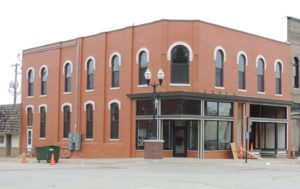
The city paid $100 for the building at 200 E. State St in April 2016. Cost of rehabilitating the building was estimated at $50,000.
Completion of the west portion of the building is now a high priority as Heartland Bank will lease it when the work is done. Heartland hopes to be open for business early next year. According to Scott Weber, who will manage the bank’s Jefferson office, the downtown location is temporary; the bank intends to build a permanent location on N. Elm St.
There is still much work to be done on the east portion of the building.
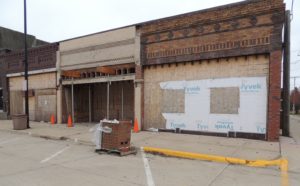
The city accepted 206 N. Wilson Ave – formerly Pizza Ranch – in March 2017 as a gift from owner Rob Schultz. Insurance coverage after the business was burned by arson – Schultz entered an Alford plea to a charge of arson – was enough to pay off the mortgage but not enough to repair the building. Clean-up and repair was estimated to cost $80-$90,000. There were potential buyers for the building at the time, but the building is unfinished and there are now no interested buyers.
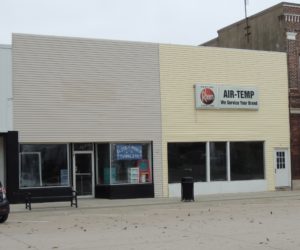
The city paid $6,600 for 107 N. Chestnut St last March. According to Sorensen, the building is in very poor condition. The council planned to put on a new roof and repair the façade using funds from the city’s economic development fund. The work has not yet been started.
The purchase was made to facilitate owner Roger Hoffman entering into an economic development agreement for the building he owns at 106 E. State St. The city agreed to provide Hoffman with $35,000 as a grant to replace the roof on that building. The grant is funded by TIF revenue.
Sorensen said the roof at 106 E. State leaks significantly, and he saw the development agreement as a way to avoid eventually making a $150,000 investment like the city did at the Lincoln Way building.
